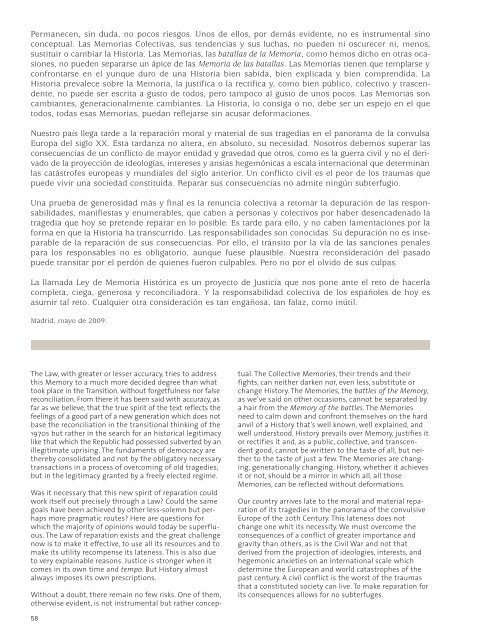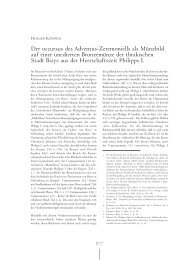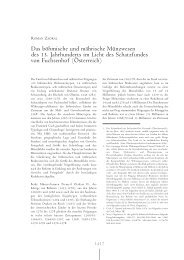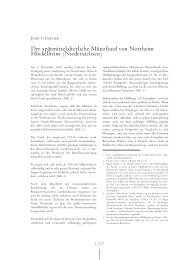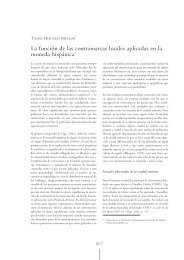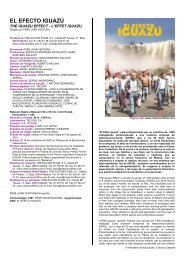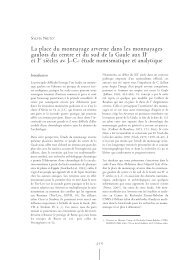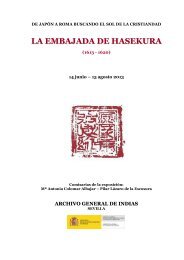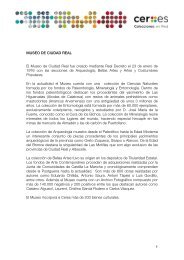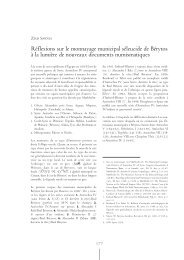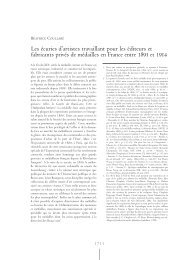La Ley de Memoria Histórica: reparación e insatisfacción Julio ...
La Ley de Memoria Histórica: reparación e insatisfacción Julio ...
La Ley de Memoria Histórica: reparación e insatisfacción Julio ...
Create successful ePaper yourself
Turn your PDF publications into a flip-book with our unique Google optimized e-Paper software.
Permanecen, sin duda, no pocos riesgos. Unos <strong>de</strong> ellos, por <strong>de</strong>más evi<strong>de</strong>nte, no es instrumental sino<br />
conceptual. <strong>La</strong>s <strong>Memoria</strong>s Colectivas, sus ten<strong>de</strong>ncias y sus luchas, no pue<strong>de</strong>n ni oscurecer ni, menos,<br />
sustituir o cambiar la Historia. <strong>La</strong>s <strong>Memoria</strong>s, las batallas <strong>de</strong> la <strong>Memoria</strong>, como hemos dicho en otras ocasiones,<br />
no pue<strong>de</strong>n separarse un ápice <strong>de</strong> las <strong>Memoria</strong> <strong>de</strong> las batallas. <strong>La</strong>s <strong>Memoria</strong>s tienen que templarse y<br />
confrontarse en el yunque duro <strong>de</strong> una Historia bien sabida, bien explicada y bien comprendida. <strong>La</strong><br />
Historia prevalece sobre la <strong>Memoria</strong>, la justifica o la rectifica y, como bien público, colectivo y trascen<strong>de</strong>nte,<br />
no pue<strong>de</strong> ser escrita a gusto <strong>de</strong> todos, pero tampoco al gusto <strong>de</strong> unos pocos. <strong>La</strong>s <strong>Memoria</strong>s son<br />
cambiantes, generacionalmente cambiantes. <strong>La</strong> Historia, lo consiga o no, <strong>de</strong>be ser un espejo en el que<br />
todos, todas esas <strong>Memoria</strong>s, puedan reflejarse sin acusar <strong>de</strong>formaciones.<br />
Nuestro país llega tar<strong>de</strong> a la <strong>reparación</strong> moral y material <strong>de</strong> sus tragedias en el panorama <strong>de</strong> la convulsa<br />
Europa <strong>de</strong>l siglo XX. Esta tardanza no altera, en absoluto, su necesidad. Nosotros <strong>de</strong>bemos superar las<br />
consecuencias <strong>de</strong> un conflicto <strong>de</strong> mayor entidad y gravedad que otros, como es la guerra civil y no el <strong>de</strong>rivado<br />
<strong>de</strong> la proyección <strong>de</strong> i<strong>de</strong>ologías, intereses y ansias hegemónicas a escala internacional que <strong>de</strong>terminan<br />
las catástrofes europeas y mundiales <strong>de</strong>l siglo anterior. Un conflicto civil es el peor <strong>de</strong> los traumas que<br />
pue<strong>de</strong> vivir una sociedad constituida. Reparar sus consecuencias no admite ningún subterfugio.<br />
Una prueba <strong>de</strong> generosidad más y final es la renuncia colectiva a retomar la <strong>de</strong>puración <strong>de</strong> las responsabilida<strong>de</strong>s,<br />
manifiestas y enumerables, que caben a personas y colectivos por haber <strong>de</strong>senca<strong>de</strong>nado la<br />
tragedia que hoy se preten<strong>de</strong> reparar en lo posible. Es tar<strong>de</strong> para ello, y no caben lamentaciones por la<br />
forma en que la Historia ha transcurrido. <strong>La</strong>s responsabilida<strong>de</strong>s son conocidas. Su <strong>de</strong>puración no es inseparable<br />
<strong>de</strong> la <strong>reparación</strong> <strong>de</strong> sus consecuencias. Por ello, el tránsito por la vía <strong>de</strong> las sanciones penales<br />
para los responsables no es obligatorio, aunque fuese plausible. Nuestra reconsi<strong>de</strong>ración <strong>de</strong>l pasado<br />
pue<strong>de</strong> transitar por el perdón <strong>de</strong> quienes fueron culpables. Pero no por el olvido <strong>de</strong> sus culpas.<br />
<strong>La</strong> llamada <strong>Ley</strong> <strong>de</strong> <strong>Memoria</strong> <strong>Histórica</strong> es un proyecto <strong>de</strong> Justicia que nos pone ante el reto <strong>de</strong> hacerla<br />
completa, ciega, generosa y reconciliadora. Y la responsabilidad colectiva <strong>de</strong> los españoles <strong>de</strong> hoy es<br />
asumir tal reto. Cualquier otra consi<strong>de</strong>ración es tan engañosa, tan falaz, como inútil.<br />
Madrid, mayo <strong>de</strong> 2009.<br />
The <strong>La</strong>w, with greater or lesser accuracy, tries to address<br />
this Memory to a much more <strong>de</strong>ci<strong>de</strong>d <strong>de</strong>gree than what<br />
took place in the Transition, without forgetfulness nor false<br />
reconciliation. From there it has been said with accuracy, as<br />
far as we believe, that the true spirit of the text reflects the<br />
feelings of a good part of a new generation which does not<br />
base the reconciliation in the transitional thinking of the<br />
1970s but rather in the search for an historical legitimacy<br />
like that which the Republic had possessed subverted by an<br />
illegitimate uprising. The fundaments of <strong>de</strong>mocracy are<br />
thereby consolidated and not by the obligatory necessary<br />
transactions in a process of overcoming of old tragedies,<br />
but in the legitimacy granted by a freely elected regime.<br />
Was it necessary that this new spirit of reparation could<br />
work itself out precisely through a <strong>La</strong>w? Could the same<br />
goals have been achieved by other less-solemn but perhaps<br />
more pragmatic routes? Here are questions for<br />
which the majority of opinions would today be superfluous.<br />
The <strong>La</strong>w of reparation exists and the great challenge<br />
now is to make it effective, to use all its resources and to<br />
make its utility recompense its lateness. This is also due<br />
to very explainable reasons. Justice is stronger when it<br />
comes in its own time and tempo. But History almost<br />
always imposes its own prescriptions.<br />
Without a doubt, there remain no few risks. One of them,<br />
otherwise evi<strong>de</strong>nt, is not instrumental but rather concep-<br />
58<br />
tual. The Collective Memories, their trends and their<br />
fights, can neither darken nor, even less, substitute or<br />
change History. The Memories, the battles of the Memory,<br />
as we’ve said on other occasions, cannot be separated by<br />
a hair from the Memory of the battles. The Memories<br />
need to calm down and confront themselves on the hard<br />
anvil of a History that’s well known, well explained, and<br />
well un<strong>de</strong>rstood. History prevails over Memory, justifies it<br />
or rectifies it and, as a public, collective, and transcen<strong>de</strong>nt<br />
good, cannot be written to the taste of all, but neither<br />
to the taste of just a few. The Memories are changing,<br />
generationally changing. History, whether it achieves<br />
it or not, should be a mirror in which all, all those<br />
Memories, can be reflected without <strong>de</strong>formations.<br />
Our country arrives late to the moral and material reparation<br />
of its tragedies in the panorama of the convulsive<br />
Europe of the 20th Century. This lateness does not<br />
change one whit its necessity. We must overcome the<br />
consequences of a conflict of greater importance and<br />
gravity than others, as is the Civil War and not that<br />
<strong>de</strong>rived from the projection of i<strong>de</strong>ologies, interests, and<br />
hegemonic anxieties on an international scale which<br />
<strong>de</strong>termine the European and world catastrophes of the<br />
past century. A civil conflict is the worst of the traumas<br />
that a constituted society can live. To make reparation for<br />
its consequences allows for no subterfuges.


